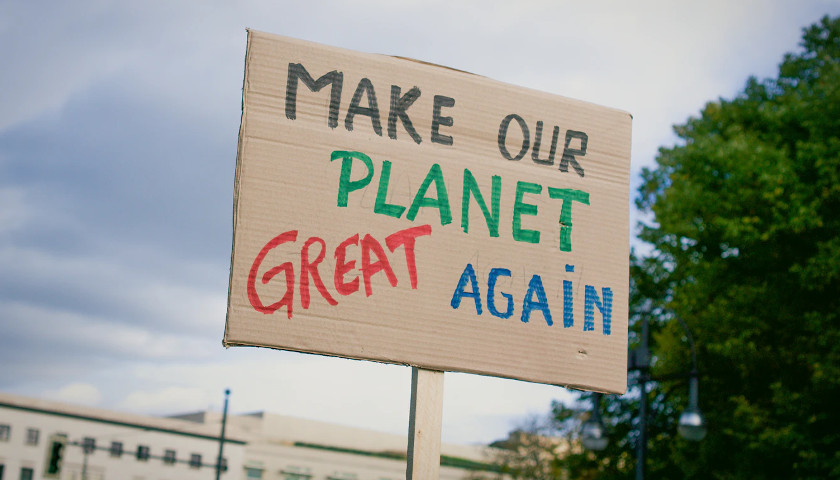by Conrad Black
The coronavirus has had, at least, the unanticipated benefit of obscuring and diminishing the very tedious public clamoring about climate change. It is a slightly redeeming virtue of crises that they tend to supersede and diminish previous crises; if a crisis is serious, public opinion can rarely worry about more than one menace at a time.
When Iran took over the role of principal promoter of terrorism in the Middle East, and Turkey, rebuffed by Europe, began imposing itself on the fringes of the Arab world, support for the Palestinian onslaught against Israel effectively collapsed. All the nonsense about Israel as an “apartheid state” has almost stopped, and the simpering of naïve or devious advocates of one big happy, multiracial Palestine (a formula for the subjugation or expulsion or even massacre of the Jews one more time) is rarely heard.
The Palestinian leadership never wanted peace, only brief cease-fires in exchange for the return of territory the Arab powers had lost in unsuccessful wars they had initiated with Israel. If there had been peace, Yasser Arafat and Mahmoud Abbas would be the despots of just another dusty little Arab country instead of world celebrities. They apparently believed that the support of the principal Arab powers was based on genuine sympathy and solidarity.
In fact, the general Arab opinion is that the Palestinians are commercial sharpers, much as they think of Jews and Lebanese Christians, and the whole red herring of Palestine was kept alive to distract the Arab masses from the misgovernment inflicted on them and the squalor generally endured in all those countries except the Gulf petrostates.
The incursions of the Iranians and Turks and the disintegration of Syria and Iraq (like the other states set up after World War I, Yugoslavia and Czechoslovakia) have made natural allies of Israel, Egypt, and Saudi Arabia. And the realistic pursuit by President Trump of a stable Middle East where American interests are protected (an unthreatened Israel, abundant oil supply—though the United States is no longer an importer—the absence of terrorist breeding grounds such as Al Qaeda enjoyed in Afghanistan, and of humanitarian disasters); all these factors have combined virtually to end the anti-Israeli agitation that roiled western academic and media circles for decades.
Canards Overtaken By Events
The coronavirus has had some of the same impact on the climate change argument. As there never has been any evidence of global warming, the eco-militants silently retreated from global warming to “climate change.” Climate may be changing, but we aren’t sure and the noisy and endless repetition that “98 percent” of expert opinion warns of the mortal danger of fossil-fuel use, which is false in itself, became a very tired argument. Affiliated organizations of the United Nations, inspired by the same political biases that have recently possessed and disgraced the World Health Organization, generated the global warming argument.
While climatologists largely agree that somewhat unusual things are occurring in the weather, it is not remotely clear whether this is outside the normal cyclical shift in the world’s temperature, whether it is influenced by human activity, what the nature of such changes may be and what their extent could be, or if they are occurring at all.
The whole academic and theoretical alliance that mistrusted the pursuit of economic growth informally merged with a broad range of conservationists. This meant the Club of Rome, and even followers of John Kenneth Galbraith, who railed against the perceived conflict between vigorous commerce and the environment in his most successful work The Affluent Society in the 1950s, made common cause with the Sierra Club, Greenpeace, and champions of duck-hunting, bird-watching, and butterfly-collecting.
The Left’s New Anti-Western Crusade
What ignited this coalition and—by attacking most energy sources and forms of locomotion fueled by petroleum products—turned it into a battering ram against almost all primary and secondary industry, was the spontaneous and overwhelming adherence of the international Left.
The Left improvised ingeniously after the collapse of international Communism, the end of the Cold War, the disintegration of the Soviet Union, and conversion of the People’s Republic of China to the virtues of economic growth. The Left saw that the most effective method of obstructing capitalism was not through the revolutionary subversion of Western governments or developing countries (though some of that persisted, especially in Latin America), but in an ostensibly nonpolitical movement that assaulted capitalism under the cloak of saving the planet and making it a happy nature sanctuary.
Just in the last year, we have all been subjected to the nonsense, the parody, of a Swedish teenager touring around the world in a wealthy eco-patron’s sailing yacht lecturing large and docile audiences, parliaments, the United Nations, on how aggrieved the youth of the world is at the fouled earth that their elders have created and will be bequeathing.
Historians of the future will look upon this phenomenon of the Western nations pouring trillions of dollars into self-impoverishment to install inefficient and hideously expensive alternative energy sources, covering the land with solar panels and windmills, as we today look on the Dutch Tulip Panic of the 17th century.
India, emulating China, is pursuing economic growth. Indians and Chinese comprise almost 40 percent of the world’s population, and neither India nor China nor Russia, nor most other countries outside Western Europe, North America, and Australasia, pay any attention to the climate change zealots. Rather China, the world’s greatest polluter, set itself up as head of the “G-77,” a bloc of 135 countries demanding reparations from the industrially advanced countries for the havoc they supposedly have wrought in the world environment. (Even Barack Obama balked at paying China.)
“A Pitiful, Helpless Giant”
Germany is the greatest power in Europe and should be, next to the United States and China, the greatest power in the world. It isn’t.
For complicated reasons buried in the mists and forest murmurs of Teutonic history, it is still somnambulating politically, allied with everyone and in a cocoon of an economic union where it amiably predominates, and in a defensive alliance led by the United States that has no real enemies at the moment. The state whose militarism intermittently terrified the world from 1870 to 1945 has now become a soft-left stuffed animal of a country that has shut down its very advanced and efficient nuclear energy program and is transforming itself into a state of thorough energy-dependence on Putin’s threadbare Russia, chronically unreliable (apart from its rascality and duplicity).
As it wanders aimlessly about in search of a national vocation, Germany has fragmented politically. The Christian Democrats and Social Democrats, which since 1949 had the support of more than 80 percent of the public, have barely 50 percent now. The Social Democrats now demand a joint assault on the coronavirus and carbon emissions, an insane proposal that would turn the German government into an agent of national self-imposed industrial penury.
There are five smaller parties, representing the far-Left, far-Right, wild-eyed greens, amiable quasi-anarchists, and bourgeois small business, of which only the last would be presentable in government with the larger parties.
Mighty Germany, the country of Bismarck, Adenauer, and Kohl, the culture of Goethe and Beethoven and Thomas Mann, having become, in Richard Nixon’s admonitory phrase, “a pitiful, helpless, giant,” is finally in reluctant flirtation with the idea that it can’t afford self-inflicted green wounds any longer. If Germany changes course on climate politics, Europe will follow, and the whole movement to deindustrialization will expire.
The international Left, after, it must be admitted, a spirited attempt to roll the world over, will have to try another angle. It would be some consolation for the human tragedy of this pandemic if we could credit it with a role in that benign outcome.
– – –
Conrad Black has been one of Canada’s most prominent financiers for 40 years, and was one of the leading newspaper publishers in the world as owner of the British telegraph newspapers, the Fairfax newspapers in Australia, the Jerusalem Post, Chicago Sun-Times and scores of smaller newspapers in the U.S., and most of the daily newspapers in Canada. He is the author of authoritative biographies of Franklin D. Roosevelt and Richard Nixon, one-volume histories of the United States and Canada, and most recently of Donald J. Trump: A President Like No Other. He is a member of the British House of Lords as Lord Black of Crossharbour.






Only common sense would end the extreme “environmental’ police. And they obviously do not possess common sense.
Don’t worry, you can still pour your used motor oil in the creek behind your house.
/S